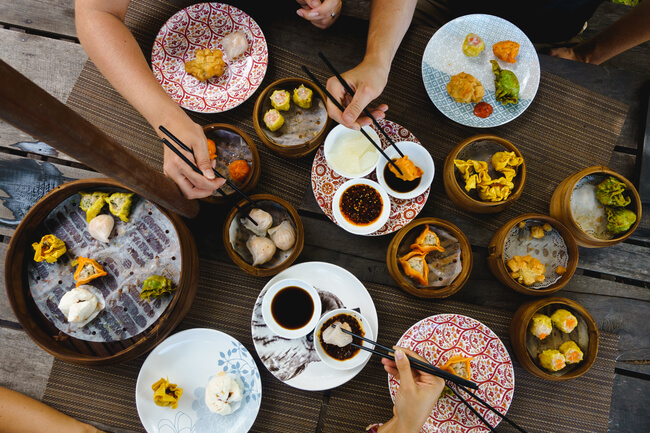20 Good Ideas To Taste the Regional Flavors of China
Wiki Article
Top 10 Tips For Exploring Local Cuisines In China
1. Tip: Know the eight Chinese culinary traditions. Sichuan cuisine, Cantonese cuisine, Fujian cuisine, Hunan cuisine, Anhui cuisine, and Zhejiang cuisine are all major Chinese dishes. Each is distinct in its dishes, flavors and methods.You can plan your dining excursion based on your preferences.Con: It's hard to remember the specifics of each dish.
2. Get Local Foodie SpecialtiesTip: Try signature dishes from the region you're visiting, like Peking Duck in Beijing, Xiaolongbao in Shanghai or Hot Pot in Chengdu.Pro: A culturally rich authentic dining experience can be assured.Cons: You may be restricted in your culinary explorations when you're located in a specific area.
3. Be aware of local flavorsTip - Sichuan food can be spicy and dulling. Cantonese dishes are light, fresh and sweet. Jiangsu is delicate and sweet. Select dishes according to the tolerance to spice and your preferences.Pro The benefit is that you will be able to order dishes that are suitable for your tastes and not have them shipped back.Con: Some flavors are difficult to master and could need a lot of testing.
4. Take advantage of street FoodTake a bite of street food in every city. For instance in Beijing you can get Jianbing which are savory crepes. In Xi'an they have Roujiamo, which is Chinese burgers. Try something new and local snacks.Pro: Street foods are cheap, quick and convenient. They also give an insight into the local scene.Cons: Hygiene could be a problem in certain instances; select vendors with a high turnover.
5. Learn Basic Dining EtiquetteUnderstanding Chinese dining customs is important. For instance, having meals with family members, and not sticking chopsticks up in the rice are all a part of this.Pro: Remains true to local customs and traditions, which enhances the dining experience.Cons: Learning and adapting to a new etiquette can take time.
6. Ask for local recommendationsLocals know what the most delicious dishes or restaurants are in their local area. Do not be afraid to ask for assistance.Pro: Helps you discover hidden gems and stay clear of tourist traps.Cons Con: Communication can be difficult due to language barriers.
7. Be prepared for unfamiliar ingredientsTaste regional cuisines made with exotic ingredients like bamboo shoots, tofu that smells or lotus root. Be open to new cuisines.Pro: Increases your taste and deepens your appreciation of Chinese cuisine.Cons: Certain meals may not suit your taste or dietary requirements.
8. Accommodate Dietary RestrictionsTip: Use Mandarin to express your food allergy and food preferences.Pro: Ensures a safer dining experience that is customized to your requirements.Cons: Some cuisines are limited in their choices. very few options to meet particular dietary needs.
9. Mix regional and local drinks with your food.Explore local drinks such as Shaoxing tea, wine, and baijiu, which are found in the north of China.Pro: Complements the cuisine and enhances the experience.Con: Baijiu and other strong flavors might not be appropriate for all.
10. Avoid OverorderingTips: Chinese dishes are typically served in a family setting, so choose moderately and then add more as you need to.Pros • Reduces food waste. Allows you to try several meals.Con: Because of the variety of options It can be tempting for you to order too much.
Discovering regional cuisines is a excellent way to get to know China.Diverse Flavors Experience an incredible variety in tastes methods, ingredients, and more.Cultural insight: Develop more understanding of the regional identity and customs.Affordability: Many local dishes and snacks are priced to be affordable.Memorable memories: Taste iconic dishes that are indigenous to their roots. This will help create unforgettable memories.Cons of Exploring Chinese Regional CuisineConcerns about hygiene The food industry and smaller restaurants may not meet international standards for cleanliness.Language Barriers: The menus and explanations are often only available in Mandarin. This makes it difficult to place orders.Certain people may have difficulty with certain flavors or textures.Dietary restrictions: People with extreme food sensitivities or who are strict vegetarians can struggle to eat in certain regions.By following these guidelines and pursuing your curiosity will enable you to taste the vast array of local Chinese food, while overcoming any difficulties. View the most popular discover hidden food gems in China for more recommendations including discover China regional dishes, regional Chinese cuisine highlights, a taste of China best local foods, explore China food scene, must-try foods in China, a tour of China regional cuisine, a culinary journey through China, Chinese cuisine you need to try, a guide to eating like a local in China, a culinary journey through China and more.

Top 10 Tips When Visiting Temples That Are Famous In China During The Time Of The Year.
1. Visit in Off-Season(Autumn/Winter).Tip. You should consider visiting the famous Chinese temples during times when the weather is cooler (usually from November to February). This is when there are fewer visitors and the weather is cooler.
Pro: It is quieter and offers an ambiance that is more peaceful.Cons: The weather could be colder, which may make outdoor temple tours less enjoyable.2. Be prepared for extreme weather conditionsTip: Temperatures may be extremely different in the various seasons. Winter can be very cold, while summers can be scorching. Check the forecast and pack accordingly.
Pro: Prepare yourself for any weather conditions and enjoy your trip in comfort.Con The challenge of packing for extremes of seasonal weather isn't easy, particularly in light travel.3. Visits to Vibrant Flora in Spring and the summer months.Tips: If you visit temples in the spring and summer You can take in beautiful gardens with blooming flowers and beautiful landscapes.
The grounds of the temple are an amazing place to visit.Con: Summers tend to be very hot, and it can be very crowded.4. Take into consideration festivals and special events.Make sure to visit during traditional festivals like Chinese New Year or Mid-Autumn Festival. These special times allow you to take part in the rituals, celebrations and experience the vibrant tradition of the temple.
Pro: There are a lot of temples that offer traditional and thrilling events. This is a great way to experience a new worldview.Con: Temples are known to be packed and hotel prices can rise during the festival season.5. Avoid Peak Holiday SeasonsTips Beware of visiting during peak tourist seasons (e.g., Chinese New Year, Golden Week in October) during which temples may be filled with local as well as international visitors.
Pro: A more tranquil experience without the crowds.Con: You might not be able to catch some of the special events if in the area during peak times.6. Make sure to check for winter closures of TemplesYou should check ahead to see if the temples you plan on visiting are open or closed in winter. This is particularly true for those who live in remote regions or areas. It is best to verify in advance.
You can cut down on unnecessary trips by preparing ahead.Con: There could be a cut in operating hours or temples closed entirely to allow construction work.7. Early Morning Visits During the summerIf you're planning to visit during summer, try to arrive early so that you can avoid the heat of midday. The majority of temples open at dawn, and this time is peaceful with fewer visitors.
Benefits: Enjoy peace and quiet without the crowds.Cons: It requires the early morning to get up that is not ideal for everyone.8. Be prepared for rain in Summer.Tip: Heavy rains are common in the summer months, especially in the southern region of China. Pack rain gear or an umbrella for trips during summer.
Pro: You can enjoy the temples' beauty, even in the event of rain.Cons: Rain may make outdoor activities more difficult and cause temple grounds to be slippery.9. Visit Mountain Temples during AutumnTips: The fall leaves provide a gorgeous backdrop for temples in mountainous areas (e.g. Mount Wutai and Mount Emei), as it is a time when the weather is nice.
Pros: The cooler temperatures make outdoor activities and hiking more enjoyable. The mountain views are spectacular.Con: Mountain temples that are popular can still attract crowds particularly on weekends and holidays.10. Consider the Lunar Calendar in Specific CasesTip: Many temples in China follow the lunar calendar, and certain rituals or occasions are associated with certain lunar dates. It is possible to use the calendar to plan your trip and also attend important events such as the Lantern Festival or Buddha's birthday.
Pros: Greater understanding of the spiritual practice of Buddhism and other the unique cultural experiences.Con: It may take more time to study and plan on the lunar calendar and events may not align with your travel dates.The Benefits of Going to Chinese Temples in the SeasonThere are fewer crowds. Travelling off-season can be a quieter, more contemplative trip.Cultural Festivals: These events can provide greater understanding of local religions and cultures.The beauty of the landscape. The seasons of spring and autumn are great times to enjoy stunning landscapes. The beautiful gardens that surround temples are also a great option.The weather is cooler in winter and autumn.The cons of going to Chinese temples during the holiday seasonUnpredictable weather: The winter can be extremely cold and the summer is too hot. This could impact your comfort.Some temples are closed in extreme weather conditions or during the off-season.The Temple Can Get Crowded: Festivals and holidays that are well-known can draw huge crowds. This makes difficult to enjoy the peaceful atmosphere in the temple.Limitations on Activities Some seasonal events and ceremonies are not permitted to take place if you arrive outside of the appropriate timeframe.Select the appropriate time of year for visiting China's most well-known temples and plan your trip accordingly. This will ensure you have a memorable experience. Understanding seasonal dynamics is key to making the most of any trip. Have a look at the recommended savor the flavors of China for more info including journey through China food culture, savoring the best of Chinese cuisine, journey through China food culture, culinary tours of China best cities, discover hidden food gems in China, famous foods in China cities, China culinary heritage, experience traditional Chinese food, discover Chinese street food, a culinary journey through China and more.
